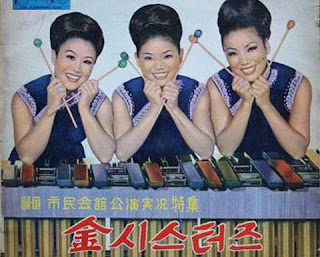I grew all excited when I saw the headline in the Chosun Ilbo this morning: “5 Decades of Korean Girl Bands.” It even started promisingly, with an opening graph about the Kim Sisters.
But then came sadness, as the article jumps abruptly from the Kim Sisters of the 1950s to SES in the late 1990s. From there, it merely lists the major girl groups of the past decade — SES, FinKL, Baby VOX, Jewelry, Wondergirls. Sigh.

Strangely, the article even asks, how did we go from groups like the Kim Sisters to the manufactured eye candy of today? But then it leaves a non-answer by critic Lim Jin-mo and gives a vapid rundown of a few vapid groups. While, of course, posting as much eye candy as possible. Thereby kind of answering their own question.
“Why are today’s girl groups just eye candy?”
“I don’t know, but here are some pretty pictures.”
That Mr. Lim is quite the go-to guy for music analysis these days. He is quoted heavily in this recent Korea Times story about K-pop. Heck, even I interviewed him for that Rain documentary on Discovery Channel that I worked on earlier in the year.
In the KT article, Lim, as usual, presents his argument about pop culture in moral terms, which I rarely like.
“The utmost value of today’s music consumers in listening to music is ‘fun.’ They no longer seek any serious messages or meanings from music as people did back in the 1980s and ’90s. I’d bet this fun-oriented appetite of listeners will continue for years to come,” he said.
First of all, there is nothing wrong with “fun.” We are talking about pop music after all, which is supposed to be popular. “Good” in no way precludes “fun”.
Secondly, it is such a middle-aged gripe to complain that culture used to have meaning when I was young, but now it is all shallow and garbage. He similarly complains about the media and the music labels, saying they are all shirking their responsibilities and are only about money. Zzzzzz.
I call them “should” arguments. He should do this. They should do that. Like when he talks about Korean artists learning English to succeed in the West:
“But their ultimate goal there should be standing on stage with Korean-version songs with a very Korean sound, which would be the completion of the Korean wave.”
As I have argued several times before, when it comes to big picture issues, I am much more interested in systems than morals. All the “shoulds” in the world will not do much if you have a system that is pushing people toward a “shouldn’t”.
If you want people to have wider interests, maybe you should make those options more available. I have written before about the importance of live music as the foundation to a more natural, organic music system, and how Korea does not have much of a live scene despite having so many talented, creative young people. But even if someone were to be interested in a Korean indie band, how would you find them? The resources in Korea are very few, poorly organized, and poorly supported. The live music venues have terrible websites that rarely post their schedules more than a few days in advance. Cyrock has stopped updating. Weiv rarely posts about modern Korean music anymore. Lord, I miss MDM magazine.
(Of course, there is always Indieful ROK and the Korea Gig Guide, at least for you foreigners. Oh, and newbie site Pocket of Sky for lyric translations).
Okay, now I am really digressing. I started off talking about girl groups and how they have evolved, then I devolved into a bunch of other issues. But it would be nice if important national publications like the Chosun Ilbo were to address issues like this with a little depth and research instead of just printing pictures of young women in short skirts. (Great, now I’m making a moral argument, too).
(Btw, I think my headline for this post would have been better were there not a Korean band called the “O! Brothers”. It confuses the sarcasm. So apologies all any and all who read this hoping for comments about them and surf-rock in Korea.)








